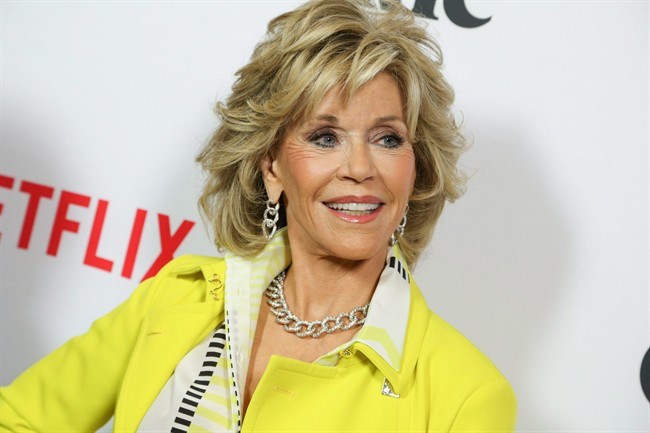Actress and activist Jane Fonda is in Vancouver over the weekend to speak at Greenpeace’s Toast the Coast event at Jericho Beach. The Province’s Nick Eagland met with Fonda beforehand to talk about the purpose behind her trip. This interview has been edited and condensed.
How does is feel to be in Vancouver?
I love it here. It’s not that I’ve been here a lot but this coastline has been important in my life. I have fished on the Campbell River. The very first time in my life that I was arrested was in Tacoma marching with First Nations people. It’s just a very special place and even more so now that we’re becoming aware of the incredible courage of First Nations people standing up to the pipelines that would bring tar sand oil from Alberta to the coast.
What are the key issues you’ve come to speak about?
We have to stop the expansion of the tarsands oil with the pipelines that would be bringing it here. The drilling of the Arctic must not start because that means more tankers going up and down the coast. There’s another way to go and that is clean energy. It’s been working for a long time.
What are your concerns around fossil fuels use?
All the fossil fuel we’ve already used has created a situation that is really dangerous: more violent storms of all kinds, hurricanes, typhoons, sea waters rising, threatening island nations and coasts. But also cancer: talk to anyone that lives around the tarsands in Alberta, the cancers are going up. Asthma: the air is being poisoned, the water’s being poisoned. Global scientists across the board say we have to stop (global warming) at two degrees Celsius or less. And we have to do it soon.
What are you hoping to achieve by speaking at Toast the Coast?
I’m not a leader. It’s not me that stopped the pipelines, it’s not me that has been speaking for decades and decades about the Earth and how we have to protect it; it’s the people that are there on the beach, the First Nations and others. But I can help amplify their voices.
The toxic bunker fuel spill in English Bay in April was a big eye-opener for Vancouver residents. What can we learn from incidents like that?
There’s going to be spills. They — meaning big oil, the Kinder Morgans, the Shells, the Exxons — they’ll say, ‘Ah, we’ve got it solved, we’ve done everything we need to do.’ And then they don’t. My mantra has always been ‘It’s never too late,’ my whole life is an example of ‘It’s never too late.’ This is one instance where it’s too late. We can’t afford any more drilling or any more spills. I have grandchildren — I want them to have a livable future.
What can Canadians do to help?
I think Canadians know better than I do because they’re doing it. Maybe change your prime minister (Stephen Harper)? When you have an elected official who is riding roughshod over democracy and calling the wrong people terrorists, maybe that person needs to be pushed aside and you have to move on. I mean, I am stupefied that my president, (Barack) Obama, gave permission to Shell to drill in the Arctic. I think maybe he thought we weren’t paying attention. See, that’s why these rallies like (Toast the Coast) are important — they have to know we’re paying attention.
Last month, the Lax Kw’alaams First Nation rejected a $1.15 billion deal to have an LNG facility built on ancestral lands. What kind of a message do you think that sends to other First Nations?
It’s the message of Christ, it’s the message of Ghandi, it’s the message of Martin Luther King. They show the way. You don’t have to sell out. But we also have to understand how hard it is where people who are so poor and there are no jobs except these high-paying jobs for these oil companies. And so, while we’re saying no more drilling, no more pumping, no more burning, we also have to be creating new jobs so that all these people will have a place to go — jobs with dignity, jobs with a future, jobs that aren’t going to compromise their health. That’s why getting the (energy) alternatives up and running they way they’re doing in so many places is so important.
What’s next?
The big climate conference in Paris. And then what I’m hoping is that Naomi Klein (Canadian author of This Changes Everything: Capitalism vs. The Climate) — she wrote a book that just absolutely galvanized me — I’m hoping that we can go on a tour of North America to get this message out.



